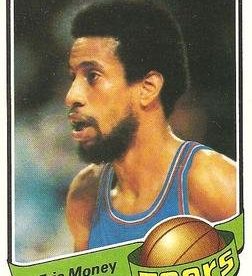When the NBA Doubled Its Money

As pro basketball players go, Eric Money is as forgettable as they come. Here’s the entirety of his Wikipedia entry (as of this writing), excluding the inbox in the right column:
Eric V. Money (born February 6, 1955) is a former American professional basketball player born in Detroit, Michigan.
A 6′ 0″ guard from the University of Arizona, Money played six seasons (from 1974 to 1980) in the National Basketball Association as a member of the Detroit Pistons, New Jersey Nets, and Philadelphia 76ers. He averaged 12.2 points per game in his NBA career.
Money was one of several professional basketball players to appear in the 1979 film The Fish That Saved Pittsburgh.
But on November 8, 1978 — officially speaking — Money did something few if any other players in NBA history have ever accomplished. That evening, the 76ers hosted the Nets, beating them by a score of 123-117. Money was the Nets second-leading scorer that night putting up 23 points in the losing effort. But when the game ended, he walked off the court all smiles and with a win to his team’s credit. Before the game was over, he found himself playing for the other team, scoring four additional points for the hometown Sixers. Somehow, Eric Money likely became the first NBA player to score points for both teams in the same game. Don’t take my word for it: here’s the box score.
How did this happen?
If you were in the stands on the date above, you wouldn’t have seen a 123-117 Sixers victory. Instead, you would have witnessed a much closer game — one which went into double-overtime with the Sixers winning 137-133. But the last few minutes of the game were erased from history because the referees made a clear, significant, and in the eyes of the league office, reversible error. With five minutes and fifty seconds left in the game, Nets forward Bernard King did something which the refs found unacceptable, and the refs slapped King with something called a technical foul, a special type of foul often used when players misbehave on the court (e.g. bumping into a ref intentionally). That was King’s second technical foul of the game, and by rule, caused him to be ejected. As he stormed off the court, he kicked one of the chairs on the Nets bench. For this, the referee, a rookie named Roger McCann, gave King a third technical foul. The Nets coach argued that you can’t give three technicals — once you get two, you’re ejected and can’t be further punished. McCann disagreed and tossed another technical foul at the coach for arguing (his second of the game, causing his ejection) and an additional one when he stormed off the court.
All those fouls gave the Sixers extra chances at uncontestable points. As the game was very close, the Nets protested the result. Their argument was the same as their coach’s: you can’t give more than two technicals, per player/coach, per game — at least not for misbehavior. Therefore, the Nets argued, King’s third and the coach’s second and third technicals should have never happened. The league — and this is exceptionally rare — agreed. The league ordered that the game be reset and resumed from the 5:50 mark.
None of this happened instantly, though. The teams had to file paperwork and the league had to deliberate and rule. Days passed and the NBA’s schedule provided a new problem: the Nets weren’t in Philadelphia all that often. The teams couldn’t resume their game until March 23, 1979. And by that time, the Nets probably didn’t care all that much about the outcome. When the two teams faced off in November, the Nets had eight wins to only five losses, and still had hopes of making the playoffs. By late March, though, they were 34-37; those hopes were long extinguished. In fact, they had waved the white flag more than a month earlier, when they began trading away players in hopes of rebuilding. Atop the list of traded players? Eric Money, who the team sent to Philadelphia.
The rekindled November 8th game resumed on that March afternoon, this time with Money playing for the home team Sixers. (Harvey Catchings and Ralph Simpson, two of the players the Nets received in return, also played for both teams that day, but neither scored any points for the Nets nor registered any other stats except for minutes played.) The loss of the extra technical fouls didn’t seem to matter — the Sixers were now able to beat the depleted Nets without needing to go to overtime. And for good measure, the Sixers beat the Nets in the scheduled game on that March date, 110-98. Money, who started the first game on the losing team, ended the day with two wins to his team’s credit.
Bonus fact: In 2005, an Oklahoma man named Eric James Torpy was arrested on charges of robbery and shooting with intent to kill. His attorneys and the district attorney came to an agreement — Torpy was to plead guilty in exchange for a 30-year prison sentence. But that wasn’t good enough for the accused. Torpy, per ESPN, wasn’t willing to accept a 30-year sentence — he insisted on a 33-year one, in honor of his favorite basketball player, Larry Bird. (Bird wore uniform number 33.) And yes, he later regretted the decision.
From the Archives: How Pride Makes Basketball Players Worse: Make a free throw just like an NBA player could — but won’t, because it looks silly.
